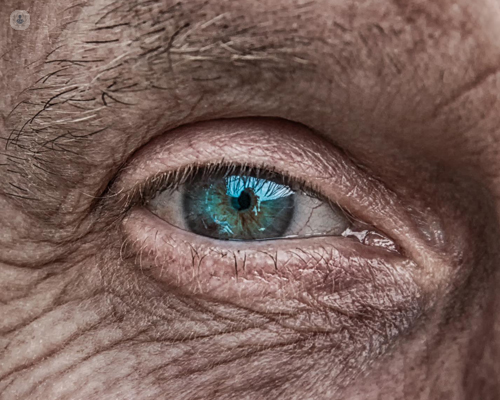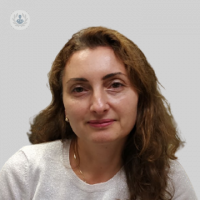An in-depth look at macular degeneration
Written by:The macula, which is part of the retina, is responsible for providing us with clear vision. Macular degeneration occurs when the macula losses its ability to produce clear images, distorting vision. Highly-experienced consultant ophthalmologist Mrs Kapka Nenova, based in East Grinstead, answers some of the most fundamental questions on this condition: what is it, what causes it, what are the symptoms, and more.

What is macular degeneration?
Macular degeneration (AMD) is an age-related disease that affects predominantly those in their seventies and over. Nowadays, we're seeing an increasing number of younger patients with this problem, most probably because the diagnostic methods and screening have improved significantly.
What causes macular degeneration?
Aging changes the metabolic processes in the eye, reducing the oxygen and blood supply to the retina. This leads to slow processes of degradation and loss of function of the retina. The retina is the connection of the eye with the brain. It is part of the nervous system and creates the image in the eye which then is processed by the brain. When the retina is damaged it creates an impaired image or simply doesn’t provide an image at all. This is why patients with macular degeneration see distorted images or have a defect in their central vision. As a result of this, they experience difficulties reading. They usually retain peripheral vision, even in the more advanced stages of the disease.
Is macular degeneration hereditary?
Macular degeneration is not hereditary. However, if members of your family have it, it’s more likely that you will develop it with aging. There is probably a genetic predisposition but this is still being researched.
What are the symptoms?
Symptoms of macular degeneration can be difficult to notice, especially if only one eye is affected. You may start noticing distorted straight lines or difficulties with reading because the letters are “jumping”. There are two types of age-related macular degeneration (AMD); dry and wet. Usually, it starts with dry and it is progressing very slowly. When the dry AMD converts into wet, the symptoms become more severe due to leaking and bleeding blood vessels in the retina, which causes a significant and sudden drop in vision.
How is macular degeneration diagnosed?
Regular checks with your ophthalmologist can help the early diagnosis of macular degeneration. There are specialised scans that are used to confirm the diagnosis. Promptly starting the treatment is essential and guarantees a better prognosis for the outcome of the treatment.
How is macular degeneration treated?
The two types of macular degeneration have different treatments. The wet type needs a long course of injections with specially designed drugs. There are several different brands but all of them are very efficient and lead to a stabilisation of the disease and an improvement in vision for the vast majority of the patients. Patients' compliance with the treatment and following the treatment intervals is essential for a successful result.
If you’re interested in booking a consultation with Mrs Kapka Nenova, you can do so directly by visiting her Top Doctors profile.



